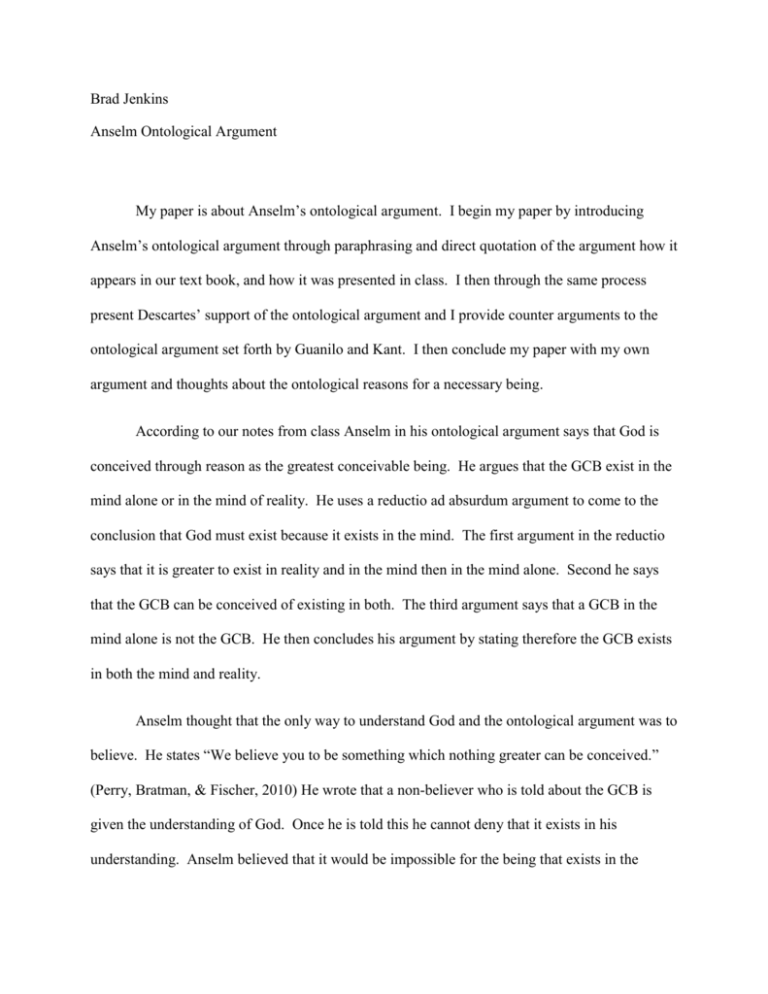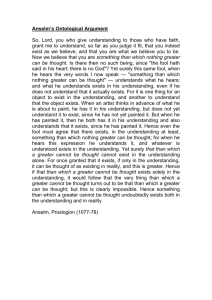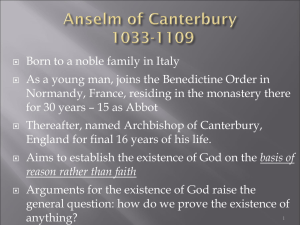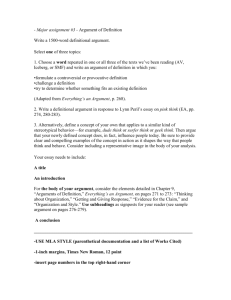Anselm Ontological Argument
advertisement

Brad Jenkins Anselm Ontological Argument My paper is about Anselm’s ontological argument. I begin my paper by introducing Anselm’s ontological argument through paraphrasing and direct quotation of the argument how it appears in our text book, and how it was presented in class. I then through the same process present Descartes’ support of the ontological argument and I provide counter arguments to the ontological argument set forth by Guanilo and Kant. I then conclude my paper with my own argument and thoughts about the ontological reasons for a necessary being. According to our notes from class Anselm in his ontological argument says that God is conceived through reason as the greatest conceivable being. He argues that the GCB exist in the mind alone or in the mind of reality. He uses a reductio ad absurdum argument to come to the conclusion that God must exist because it exists in the mind. The first argument in the reductio says that it is greater to exist in reality and in the mind then in the mind alone. Second he says that the GCB can be conceived of existing in both. The third argument says that a GCB in the mind alone is not the GCB. He then concludes his argument by stating therefore the GCB exists in both the mind and reality. Anselm thought that the only way to understand God and the ontological argument was to believe. He states “We believe you to be something which nothing greater can be conceived.” (Perry, Bratman, & Fischer, 2010) He wrote that a non-believer who is told about the GCB is given the understanding of God. Once he is told this he cannot deny that it exists in his understanding. Anselm believed that it would be impossible for the being that exists in the understanding to not exist in reality, if there were such a being it would not be “greater” and therefore not be the GCB. According Anselm reductio ad absurdum arguments should be valid because if they were denied, any explanation would be absurd and therefore false. According to the text book an ad absurdum argument is one that first takes the supposition of the opposing argument, compares it to “. . . certain or self-evident assumptions . . .” If doing this ends in a contradiction then the opposing argument is not valid. Descartes’ reasons for an ontological argument according to our class discussion and notes are based on the idea that the senses cannot be trusted. Since they cannot be trusted he said we should not rely on them for knowledge. He argues that they cannot be trusted because one’s senses can become confused like when we believe a dream we are experiencing is reality. He also suggests that it might be someone manipulating our senses, that we are brains in a vat being prodded by some evil genius. Descartes’ argues that if one can conceive of something unique that it must have come from somewhere other than the senses. Because of this he concludes that his unique idea of God must have come from God. Guanilo’s argument against Anselm is that one can conceive of an island with the greatest conceivable qualities. The description of Guanilo’s Island parodies that of Anselm’s GCB. He points out that this Island can easily be understood as being the greatest conceivable island. He then concludes that if someone were to try and convince him that this was proof of the islands existence in reality he would think that person to be the “fool”. Anselm’s response to Guanilo is that when one is thinking that the GCB does not exist he is in actuality thinking of the GCB and therefore cannot argue that this being doesn’t exist in his mind. Anselm infers that because of the certain truths of the GCB he must exist in a different sense than that of the “lost island”. Anselm in this response makes the claim that it would be impossible for the greatest conceivable being to have a beginning and an end. For if that person were to attempt to think of him not existing he is indeed thinking of this beings existence and therefore he cannot doubt that this being exists in his understanding and according to Anselm that means existence in reality as well. According to our class notes Kant argues that existence is not a predicate and that existence adds nothing to your understanding of a concept. He claims that existence is a second order predicate not to be treated as other first order predicates. “For logic pays no regard to the content of a judgment.” Kant rejects the ontological argument because the GCB is defined as being the greatest and so any proof of greatness will be usurped by the classical viewpoint of the GCB. Kant’s criticism of the Anselm’s ontological argument begins with him pointing out that the necessary being is just an idea that describes an “unattainable perfection” and that a beings existence being necessary doesn’t aid in the understanding of God. He then points out that philosophers who argue the ontological argument have never explained how they conceived these beings to begin with. He said that defining the existence of a necessary being doesn’t give us any insight into why we cannot conceive of the nonexistence of a being. Kant claims they argue that God exists because of his attributes. He argues that if one were to not think about the attributes of the GCB it would be a contradiction if the GCB continued to exist. He goes on to claim that if one denies the existence of God there would be no contradictions and that the ontological arguments only response is “. . . there exist subjects that which are absolutely necessary.” Since the argument is an a priori Kant said this argument makes the ontological argument impossible even if one could come up with conceivable being that didn’t annihilate itself with the annihilation of its predicate. He thought it absurd that someone would be convinced that something exists because of the possibility of its existence. Just because there seems to be nothing lacking in the possibility of the GCB there is no reason to assume that we should assume that one exists in reality. Kant uses one hundred dollars as an example of something that can be conceived of in the mind as one hundred possible dollars and points out that adding to this concept in his mind doesn’t increase the actual value of one hundred real dollars. Declaring that the greatest conceivable being exists does not add to the existence of the being because if it did it would be different from what was conceived in the mind. Kant next calls into question the GCB as being more than just an a priori but an a posteriori and that the a priori concept is a way to compare it to “universal conditions” but does not give any insight to the actual existence of something. I think Kant’s argument is more persuasive because he points out the error in thinking that the GCB must exist in reality as well as the mind. He was able to use logic to point to critical errors of judgment by Anselm that Guanilo’s story about the lost island failed to do. Descartes’ argument isn’t sound because he assumes that some being exists because it exists in his mind. He thinks his ideas seem unlimited and therefore the cause of the idea must be unlimited. Just because Descartes’ ideas seem unlimited doesn’t mean that his ideas are in actuality unlimited. He is still bound by his limited mind. For example my dog with her limited cognitive ability would not be able to conceive of a greater being than a human. Even though she can conceive of me or any other human being as being the greatest conceivable being due to her limited cognition, this says nothing about the quality of our greatness. Since our minds are in fact limited especially when we remove experience, we can begin to imagine that this GCB has the greatest qualities where a greater being than ourselves who is not the greatest could in fact appear to be the greatest being. But in the mind of the greater being, he sees himself lacking the qualities of his GCB. Therefore the greater being with his reason can conceive of a being greater than himself and since the GCB can understand this through his greatness then his GCB must exist in reality as well. My main objection with Anselm’s ontological argument is that he treats the reductio ad absurdum like some truth producing device. Below is the definition from our textbook. The argument that follows may be treated as a reductio ad absurdum argument. That is, it begins with a supposition (S: suppose that the greatest conceivable being exists in the mind alone) that is contradictory to what one desires to prove. One then goes about showing that (S ) together with other certain or selfevident assumptions yields a contradiction, which in turn demonstrates that the contradictory of (S ) must be true: A greatest possible being must exist in reality. My issue begins with the definition of the reduction ad absurdum argument starting with the first sentence on line 3. Anselm’s self –evident assumption that there exists a being which nothing greater can be conceived is not shared by everyone, so how can we be certain that this assumption is true. If it is not true it unravels any truth to Anselm’s argument. This is why I think he said “unless I believe I cannot understand.” You need to share his belief in classic theism to even begin to understand his argument as a truth because it is not a universal truth. I believe that’s why Kant points out that “Philosophers have always talked of an absolutely necessary being, and have nevertheless declined to take the trouble of conceiving whether-and how-a being of this nature is even cogitable. . .” Anselm’s premise should be held to the same type of scrutiny as the rest of his argument. His reductio ad absurdum argument assumes that God’s traits are consistent with the classical version of God. Since there are so many different definitions of God we must conclude that God is not being described accurately at all. Otherwise an a priory concept of God should be producing a universal conception of God that doesn’t differ. Works Cited Perry, J., Bratman, M., & Fischer, J. M. (2010). Introduction to Philosophy. New York: Oxford University Press. Page(s): 137, Philosophy of Religion: An Anthology, 6th ed. by Louis P. Pojman, Cengage Learning NOOK Study (Samantha Rachiele, sjrachiele@yahoo.com). This material is protected by copyright.








